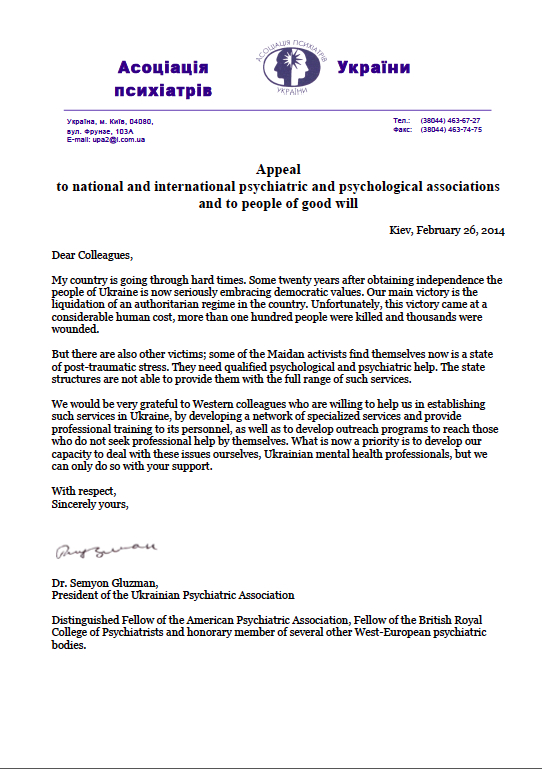Maidan Medical Fund for trauma care in Ukraine
Trauma and bereavement care in Ukraine
Over the past three months, the world has witnessed momentous events in Ukraine. What started as a protest by students in favor of an associate agreement with the European Union, turned into a people’s uprising against an autocratic and corrupt regime. After three months of mass demonstrations at the Maidan in Kyiv, and later in cities all across Ukraine, the old rulers fled the country. What happened before our eyes is not as much a choice between “East” or “West” but a revolution led by the first post-Soviet generation.
The revolution came at a very high cost. Thousands of demonstrators were wounded, some losing eyes or limbs, and at least one hundred activists were shot dead by riot police and snipers operating from buildings around the square. Undoubtedly, the number of dead will rise considerably, as many people are unaccounted for and there are fears dozens might have been killed and left in mass graves in the forests.
During this period, hospital services were set up at the Maidan, for a very urgent reason: wounded demonstrators who were delivered to regular medical services were abducted by riot police, beaten up and in some cases killed. For example, on February 19, riot police broke into the intensive care unit of the Emergency Hospital in Kyiv, turned off all the equipment and abducted the critically wounded demonstrators who were undergoing medical care to an unknown destination. And even at Maidan the wounded were not always safe. On February 18, Berkut riot police set fire to the House of Trade Unions in which the Maidan hospital was located, blocking the exists purposely. Some forty wounded fighters are feared to have burnt alive that night.
The Maidan medical teams, all volunteers of various ages and backgrounds, performed heroic deeds. They worked at the front line, rescuing wounded activists, while they themselves were under constant attack. In violation of all rules of engagement and conventions, riot police and snipers were specifically targeting medics. They were wounded by snipers, they were beaten, abducted or even arrested for performing their professional responsibilities. They put the Hippocratic Oath into effect and deserve our support and admiration.
While their work can now gradually be taken over by regular medical services, both in Ukraine and abroad, the main challenge is now to take care of those traumatized by the events. These include activists who fought at the front line and who saw their buddies being wounded or killed; these include the relatives of those killed; these also include the volunteers of the Maidan hospital, who saw the wounded and killed being brought in by the dozen, and who had to perform operations in hotel lobbies and churches and treat the wounded right in the battle zone.
Together with the Ukrainian Psychiatric Association, we try to help those dealing with trauma and grief by providing specialized trauma care, offered by experts from the region who know the circumstances and environment, and who speak the language of those affected. Our Georgian partner organizations have a long experience in working in this field and are experts in psychotrauma care. They have worked at the frontline in Georgia during military conflicts and combine high professionalism with knowledge of both the post-Soviet region and the Russian language.
The president of the Ukrainian Psychiatric Association, former political prisoner Dr. Semyon Gluzman, a world-renowned psychiatrist and human rights activist, has called upon his foreign colleagues to help make the trauma services possible. In his appeal he writes:

People who want to make donations can do so by transferring their donation to the bank account of the Federation Global Initiative on Psychiatry. We will make sure all your donations find their way to the right destination. Our partner on the ground is, among others, the Ukrainian Psychiatric Association, with whom we have worked for more than 20 years.
Our bank account is:
Bank account number: NL46 INGB 0006 0707 13
Federation Global Initiative on Psychiatry
Hilversum, the Netherlands
ING Bank - BIC code: INGBNL2A
In case you are a US citizen and you want to send us a check, please make it out to "GIP-USA" and send it to our postal address:
FGIP, P.O.Box 1282, 1200 BG Hilversum, The Netherlands
The Federation Global Initiative on Psychiatry also has a paypal account. To use that please visit the website www.gip-global.org
For more information:
rvvoren@gip-global.org or Robert van Voren on facebook

